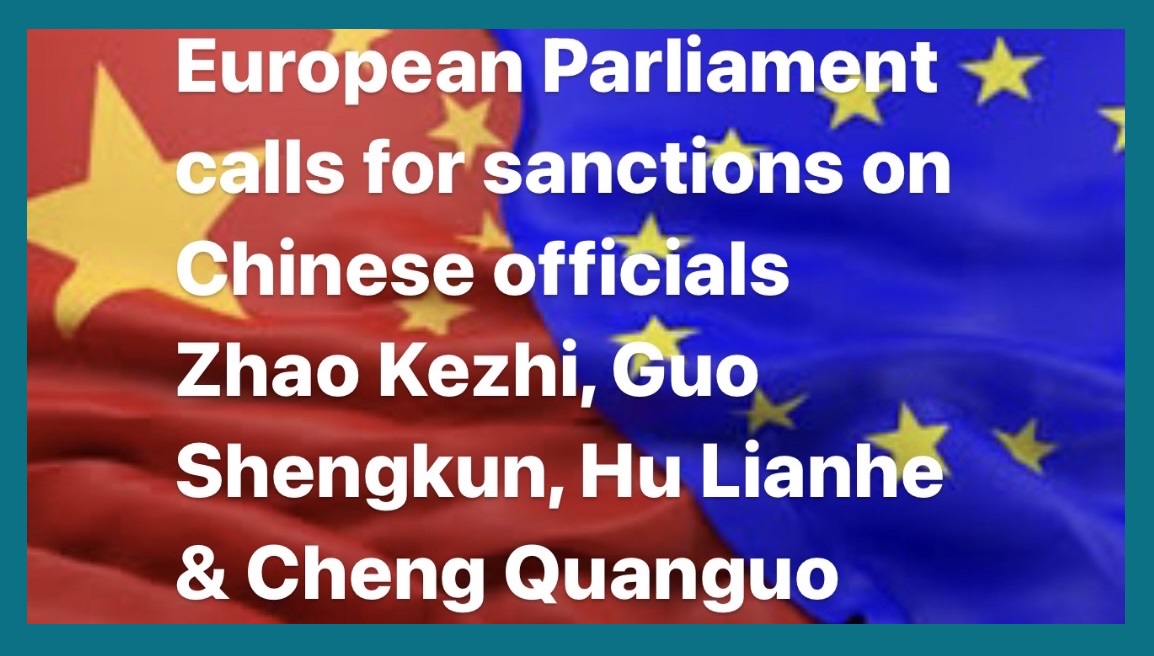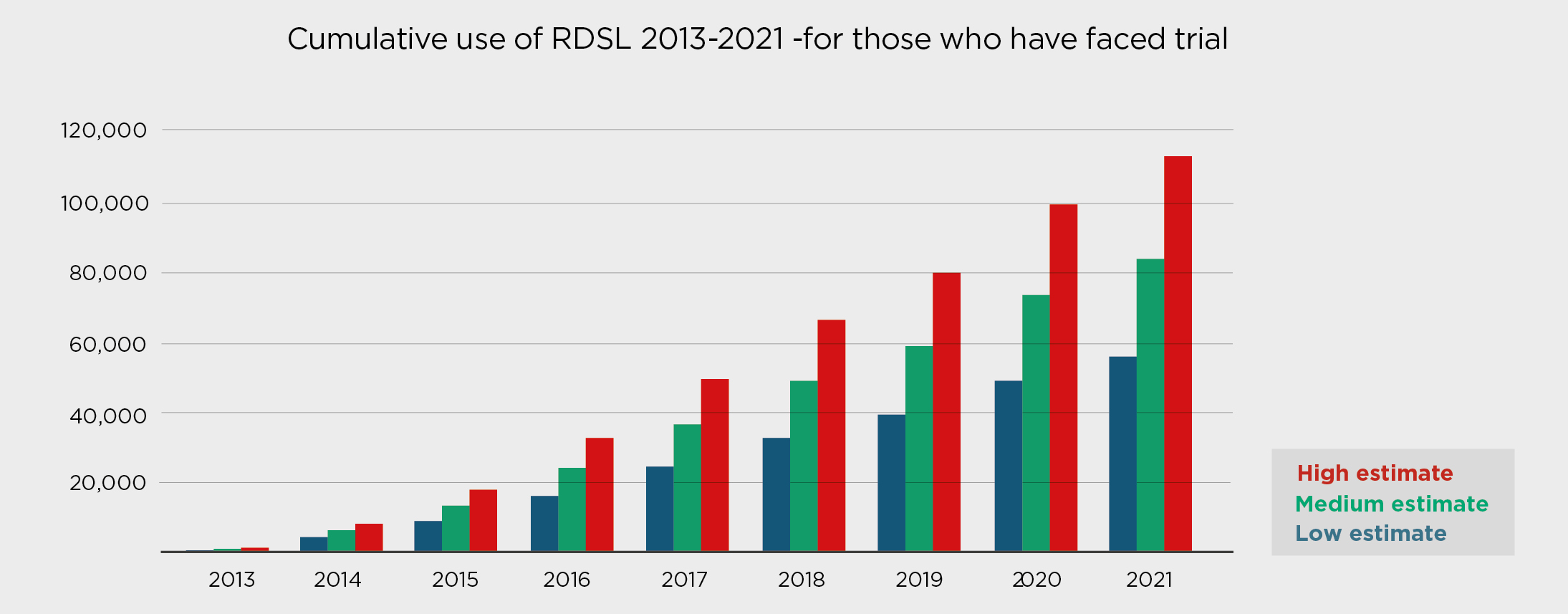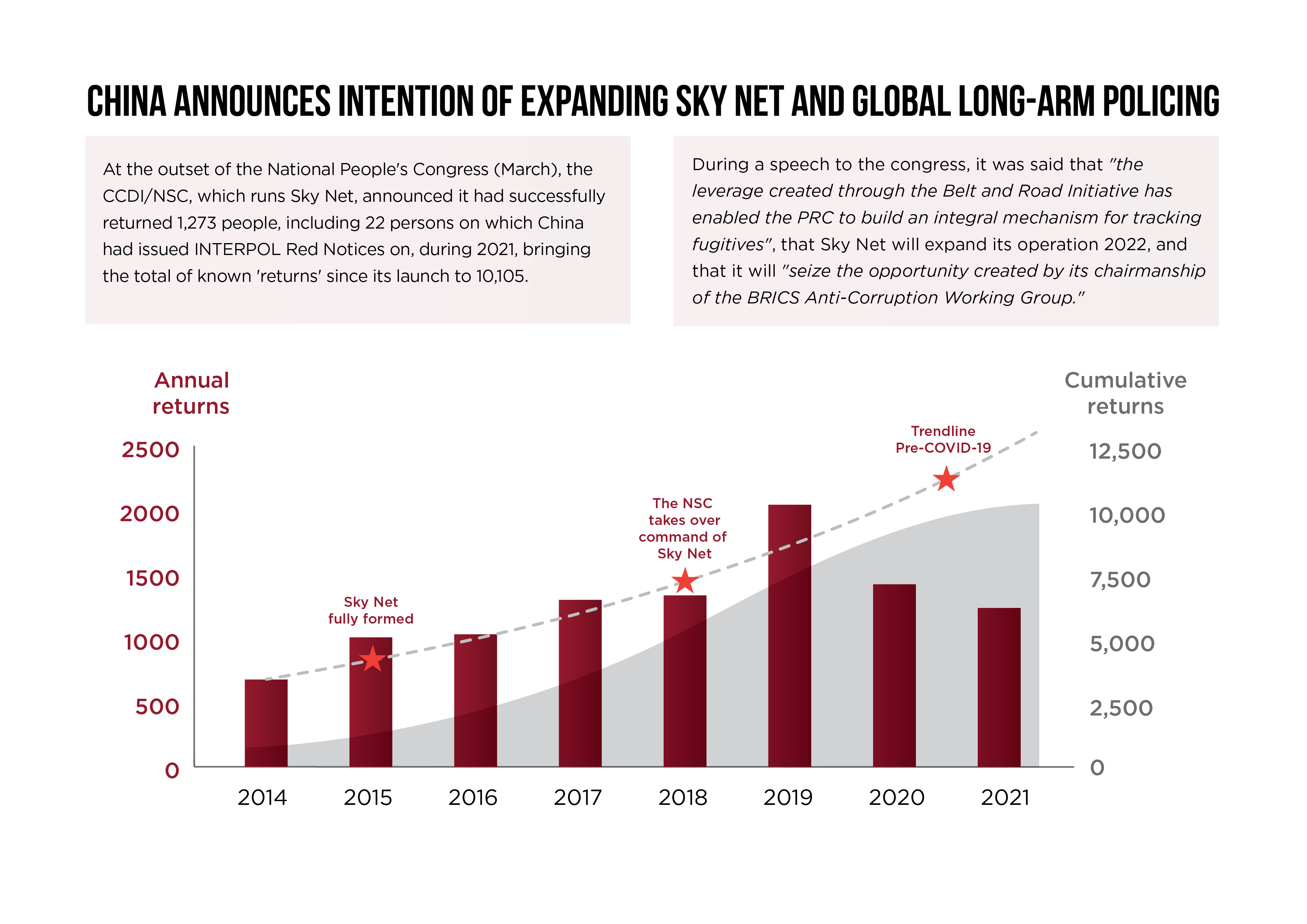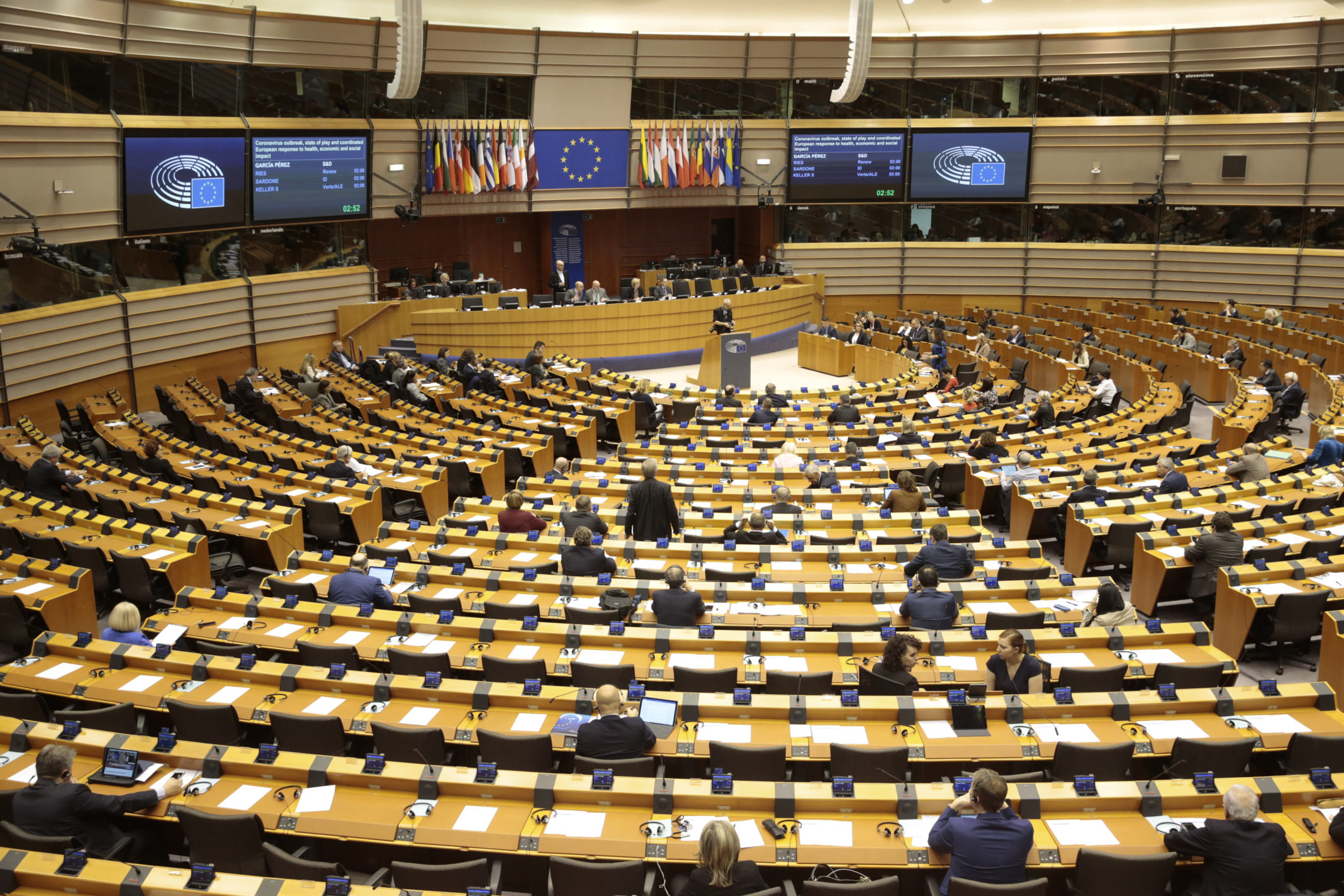EU Parliament calls for sanctions on Chief of Chinese Police and others
Today, the European Parliament adopted an urgency resolution following the release of the Xinjiang Police Files which provide further irrefutable proof of the allegations of an ongoing mass internment and surveillance campaign against the Uyghur population and other ethnic and religious minorities in the Xinjiang Uyghur Autonomous Region at the hand of the Chinese Communist Party.
While CCP officials and the Government of the People’s Republic of China continue their efforts to cover up the truth about the operations, including through a widely criticized propaganda visit by UN Human Rights Chief Michelle Bachelet last month, a growing number of Governments and parliaments have labeled the ongoing campaign as “genocide” according to the terms of the UN Convention of 1948.

Safeguard Defenders and numerous other civil society organizations have consistently called for Magnitsky-style sanctions on Chinese officials responsible for the gross human rights abuse in China and Hong Kong, as well as the suspension and review of cooperation agreements with those institutions that directly contribute to the ongoing mass human rights violations across China and increasingly around the world.We therefore salute the European Parliament’s overwhelming majority voting today’s resolution, confirming their united democratic stance in defense of fundamental human rights and their refusal to be intimidated by China’s counter-sanctions on numerous MEPs in March of last year.
The Resolution is remarkably decisive in its calls for action to the European Commission, EU Council, and the EU Member States, including:
- The expressed request for additional sanctions targeting Chinese high-ranking officials, such as Zhao Kezhi (responsible for the RSDL system), Chen Quanguo, Guo Shengkun and Hu Lianhe, as well as others that are identified in Xinjiang police files and other individuals and entities, involved in the systematic human rights violations in the Xinjiang Uyghur Autonomous Region;
- The reiterated call to the EU and its Member States to suspend the extradition treaties with China and Hong Kong;
- A call on EU Institutions and the Member States to urgently identify and mitigate risks related to Chinese foreign interference and transnational repression.
These calls coincide with reiterated key requests by Safeguard Defenders and other civil society organizations to put an end to China’s growing repression in- and outside its borders, and should be a warning call to EU Member States that remain reluctant to review and suspend their cooperation agreements with the Chinese institutions involved.
In this regard, we draw particular attention to the role played by the Ministry of Public Security (MPS), headed by the named Zhao Kezhi and previously under the command of named Guo Shengkun.
The Xinjiang Police Files confirm the central role of the Ministry of Public Security (MPS) in the commission of gross human rights violations, in particular the mass internment and surveillance of Uyghurs and other ethnic and religious minorities in the Xinjiang Uyghur Autonomous Region. Moreover, official documentation shows the MPS’ key role in other consistent human rights violations, among which: the enforced disappearance, torture and arbitrary detention of human rights defenders, journalists, lawyers and foreigners in Residential Surveillance at a Designated Location; the violent crackdown on civil society in Hong Kong; and the direction of campaigns of transnational repression under operation Fox Hunt.
Background
The Xinjiang Police Files once again highlight the crucial role played by the Chinese Ministry of Public Security (MPS) in the ongoing mass internment and surveillance campaigns in Xinjiang. Among the leaked documents, the speech by Zhao Kezhi, head of the PRC Ministry of Public Security (MPS) since November 4, 2017, provided particular insight into the leading role of the MPS and the central command over the gross human rights violations in the region.
Under Zhao Kezhi’s supervision, the MPS has reportedly been storing the DNA of Uyghurs and directing the internment camps in Xinjiang region targeting Uyghurs.[1],[2],[3],[4],[5] Local officers and entities administering the same internment camps have been previously sanctioned under the Global Magnitsky Act by the United States[6], under the Global Human Rights Sanctions Regulations 2020 by the United Kingdom[7], under the Special Economic Measures (People’s Republic of China) Regulations by Canada[8] and under the EU Global Human Rights Sanctions Regime by the European Council[9].
An internal June 15, 2018 speech by Minister of Public Security Zhao Kezhi[10], reinforces the plausibility of previous detention estimates, adding to the evidence that the People’s Republic of China (PRC) had interned between one and two million Uyghurs and other ethnic minority individuals by the late 2010s. The speech also points to Xi Jinping’s informed and active support for Xinjiang’s “re-education,” “strike hard,” and “de-extremification” campaigns, as well as for continued spending on additional detention facilities and staff to manage the influx of detainees.
Moreover, under the command responsibility of Zhao Kezhi, the MPS (together with the Ministry for State Security – MSS) is directly responsible for the enforced disappearance, arbitrary detention and torture of an estimated 60.000+ individuals – including human rights defenders, journalists, lawyers and foreigners - in the secret pre-arrest system of Residential Surveillance at a Designated Location (RSDL).
In 2013, the current form of the legal tool RSDL came into effect through the revised Criminal Procedure Law. With this tool - used by both police (MPS) and state security (MSS) - targets are disappeared and placed into incommunicado detention, without access to any form of redress, counsel, or family contact. The victims are held outside of case-handling areas and kept at secret locations, in solitary confinement for up to six months.

In its Concluding Observations on the fifth periodic report of China in February 2016, the UN Committee Against Torture stated: The Committee is of the view that these provisions, together with the possibility of refusing access to a lawyer for these types of crimes, may amount to incommunicado detention in secret places, putting detainees at a high risk of torture or ill-treatment (art. 2). The State party should repeal, as a matter of urgency, the provisions of the Criminal Procedure Law that allow suspects to be held de facto incommunicado, at a designated location, while under residential surveillance.[11] The PRC has since failed to submit its sixth periodic report which was due in late 2019.
In a 2018 Joint Allegation Letter to the Chinese authorities, ten UN Special Procedures have defined the practice of RSDL as tantamount to enforced disappearances, arbitrary detention and per se amounting to torture.[12] Torture inside the system is rampant. In March 2020, six Special Procedures reiterated “their alarm at the ongoing use of RSDL in China, despite having for many years reiterated the position that RSDL is not compatible with international human rights law.”[13]
Despite these repeated calls by international human rights mechanisms, since its limited early use on a few hundred victims in 2013, the RSDL system has expanded significantly with a 90% increase between 2019 and 2020 alone.
In her widely-critiqued statement concluding her visit to China on 28 May 2022, UN High Commissioner for Human Rights Michelle Bachelet stated: “I also share the concerns of UN human rights mechanisms about legitimate activities by lawyers, human rights defenders and others being penalized under the national security framework. UN human rights bodies have found the system of Residential Surveillance constitutes arbitrary detention and have called for its repeal.”[14]
In addition, Zhao Kezhi has revendicated the MPS’ role in the violent suppression of fundamental freedoms and civil society in Hong Kong. As the Global Times reports on 27 September 2021: “The police force must focus on cutting off the hostile mastermind home and abroad who harmed national security and smashing plot of launching the "color revolution" in Hong Kong, Chinese Public Security Minister Zhao Kezhi said on Sunday. He called on the police to continue to shoulder responsibility in helping to maintain the stability of the special administrative region and cracking down on radical secessionists.
Addressing a Party meeting of the Ministry of Public Security, Zhao said in the past two years, public security organs have been supporting governance and law enforcement of the SAR government and Hong Kong police force in the face of radical and violent crimes during protests, and that they have made great contributions for Hong Kong to move from chaos to proper governance.”
Finally, as a March 2022 statement from the National Commission of Supervision – Central Commission for Disciplinary Control’s (NSC – CCDI) Office of International Fugitive Recovery and Cross-border Corruption Control confirms, the MPS plays a central role in the PRC’s growing transnational repression efforts and the forceful return of over 10.000 individuals as a recent Safeguard Defenders’ report unveiled. Between 2014 and February 2022, official CCDI data inform that 10,105 people - including foreign citizens - have been forcefully returned to China from over 120 countries, mostly via ‘irregular methods’ which include the harassment and threats to family members in China, covert operations to threaten and harass by Chinese agents abroad, as well as kidnappings.[15]

The MPS’ direction of operation Fox Hunt and role in the PRC’s growing transnational repression[16], under the guidance of the NSC – CCDI’s wider operation Sky Net – the transnational arm of Xi Jinping’s signature “anti-corruption” campaign – is particularly concerning given the existence of (police) cooperation agreements with Western counterparts, such as the various agreements signed with Italy’s Interior Ministry in 2015 and 2017 which include joint police patrols on Italian soil[17].
On March 21, 2022, the U.S. State Department announced visa restrictions on PRC officials for their involvement in repressive acts against members of ethnic and religious minority groups and religious and spiritual practitioners inside and outside of China’s borders, as part of ongoing efforts to promote accountability for transnational repression committed by People’s Republic of China (PRC) officials.[18]
 Credit: NewEurope
Credit: NewEurope
[1] Human Rights Watch, China: Minority Region Collects DNA from Millions, 13 December 2017, av. at: https://www.hrw.org/news/2017/12/13/china-minority-region-collects-dna-millions
[2] The New York Times, China Uses DNA to Track Its People, With the Help of American Expertise, 21 February 2019, av. at:
https://www.nytimes.com/2019/02/21/business/china-xinjiang-uighur-dna-thermo-fisher.html
[3] James Millward and Dahlia Peterson, China’s system of oppression in Xinjiang: how it developed and how to curb it, September 2020, av. at: https://www.brookings.edu/wp-content/uploads/2020/09/FP_20200914_china_oppression_xinjiang_millward_peterson.pdf
[4] The New York Times, How China Uses High-Tech Surveillance to Subdue Minorities, 22 May 2019, av. at: https://www.nytimes.com/2019/05/22/world/asia/china-surveillance-xinjiang.html
[5] The Intercept, Revealed: Massive Chinese Police Database, 29 January 2021, av. at: https://theintercept.com/2021/01/29/china-uyghur-muslim-surveillance-police/
[6] U.S. Department of the Treasury, Treasury Sanctions Chinese Entity and Officials Pursuant to Global Magnitsky Human Rights Accountability Act, 9 July 2020, av. at: https://home.treasury.gov/news/press-releases/sm1055; U.S. Department of the Treasury, Treasury Sanctions Chinese Entity and Officials Pursuant to Global Magnitsky Human Rights Executive Order, 31 July 2020, av. at: https://home.treasury.gov/news/press-releases/sm1073; and U.S. Department of the Treasury, Treasury Sanctions Chinese Government Officials in Connection with Serious Human Rights Abuse in Xinjiang, 22 March 2021, av. at: https://home.treasury.gov/news/press-releases/jy0070
[7] Office of Financial Sanctions Implementation, Financial Sanctions Notice, 25 March 2021, av. at: https://assets.publishing.service.gov.uk/government/uploads/system/uploads/attachment_data/file/973250/Notice_Global_Human_Rights_250321.pdf
[8] Global Affairs Canada, China Sanctions, 22 March 2021, av. at: https://www.canada.ca/en/global-affairs/news/2021/03/china-sanctions.html
[9] European Council, Council Decision CFSP (2021/481), 22 March 2021, av. at: https://eur-lex.europa.eu/legal-content/EN/TXT/PDF/?uri=OJ:L:2021:099I:FULL&from=EN#page=29
[10] Adrian Zenz, Public Security Minister’s Speech Describes Xi Jinping’s Direction of Mass Detentions in Xinjiang, 24 May 2022, av. at: https://www.chinafile.com/reporting-opinion/features/public-security-ministers-speech-describes-xi-jinpings-direction-of-mass.
[11] UN Committee Against Torture, Concluding Observations on the fifth periodic report of China, CAT/C/CHN/CO/5, §14-15, 3 February 2016, av. at: https://tbinternet.ohchr.org/_layouts/15/treatybodyexternal/Download.aspx?symbolno=CAT%2fC%2fCHN%2fCO%2f5&Lang=en
[12] Mandates of the Working Group on Arbitrary Detention; the Working Group on Enforced or Involuntary Disappearances; the Special Rapporteur on the promotion and protection of the right to freedom of opinion and expression; the Special Rapporteur on the rights to freedom of peaceful assembly and of association; the Special Rapporteur on the right of everyone to the enjoyment of the highest attainable standard of physical and mental health; the Special Rapporteur on the situation of human rights defenders; the Special Rapporteur on the independence of judges and lawyers; the Special Rapporteur on the right to privacy; the Special Rapporteur on the promotion and protection of human rights and fundamental freedoms while countering terrorism; and the Special Rapporteur on torture and other cruel, inhuman or degrading treatment or punishment, OL CHN 15/2018, 24 August 2018, av. at: https://safeguarddefenders.com/sites/default/files/wp-rsdl/uploads/2018/10/Joint-Letter-OL-CHN-152018.pdf
[13] UNOHCHR, China: UN experts gravely concerned by enforced disappearance of three human rights defenders, 23 March 2020, av. at: https://www.ohchr.org/EN/NewsEvents/Pages/DisplayNews.aspx?NewsID=25735&LangID=E
[14] UNOHCHR, Statement by UN High Commissioner for Human Rights Michelle Bachelet after official visit to China, 28 May 2022, av. at: https://www.ohchr.org/en/statements/2022/05/statement-un-high-commissioner-human-rights-michelle-bachelet-after-official.
[15] Safeguard Defenders, Involuntary Returns, 18 January 2022, av. at: https://safeguarddefenders.com/en/blog/involuntary-returns-report-exposes-long-arm-policing-overseas.
[16] Safeguard Defenders, China announces expansion of Sky Net and long-arm policing, 28 March 2022, av. at: https://safeguarddefenders.com/en/blog/china-announces-expansion-sky-net-and-long-arm-policing.
[17] Laura Harth, L’Italia muta sugli uiguri. E lavora con la polizia cinese, 26 May 2022, av. at: https://formiche.net/2022/05/polizia-cinese-italia-uiguri/.
[18] U.S. Department of State, 21 March 2022, Promoting Accountability for Transnational Repression Committed by People’s Republic of China (PRC) Officials, av. at: https://www.state.gov/promoting-accountability-for-transnational-repression-committed-by-peoples-republic-of-china-prc-officials/.